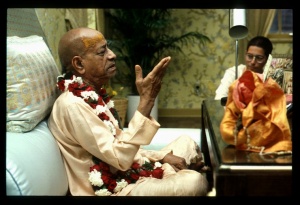CC Madhya 3.212 (1975)

A.C. Bhaktivedanta Swami Prabhupada
TEXT 212
- nirapekṣa hañā prabhu śīghra calilā
- kāndite kāndite ācārya paścāt calilā
SYNONYMS
nirapekṣa—indifferent; hañā—becoming; prabhu—the Lord; śīghra—very quickly; calilā—went; kāndite kāndite—crying and crying; ācārya—Advaita Ācārya; paścāt—behind; calilā—went.
TRANSLATION
Śrī Caitanya Mahāprabhu was unaffected. He left swiftly, and Advaita Ācārya followed Him weeping.
PURPORT
As Śrīla Bhaktisiddhānta Sarasvatī Ṭhākura explains, the word nirapekṣa means not being affected by anything material and remaining fixed in the service of the Lord. Śrī Caitanya Mahāprabhu did not very much care for the roaring tumult and cry at the house of Advaita Ācārya, which He heard when starting for Jagannātha Purī. Worldly moralists may criticize Śrī Caitanya Mahāprabhu for being very cruel, but the Lord did not care for such criticism. As the world teacher of this Kṛṣṇa consciousness movement, He actually showed that a person seriously engaged in Kṛṣṇa consciousness should not be affected by worldly affection. The best course is to engage in rendering service to the Lord and to become callous to material objectives. Externally everyone is attached to material things, but if one becomes entangled in such things, he cannot make progress in Kṛṣṇa consciousness. Therefore those who are engaged in Kṛṣṇa consciousness should not care for the so-called morality of the material world if that morality opposes the service of the Lord. As Lord Caitanya Mahāprabhu has personally shown, one cannot properly execute Kṛṣṇa consciousness without being neutral.